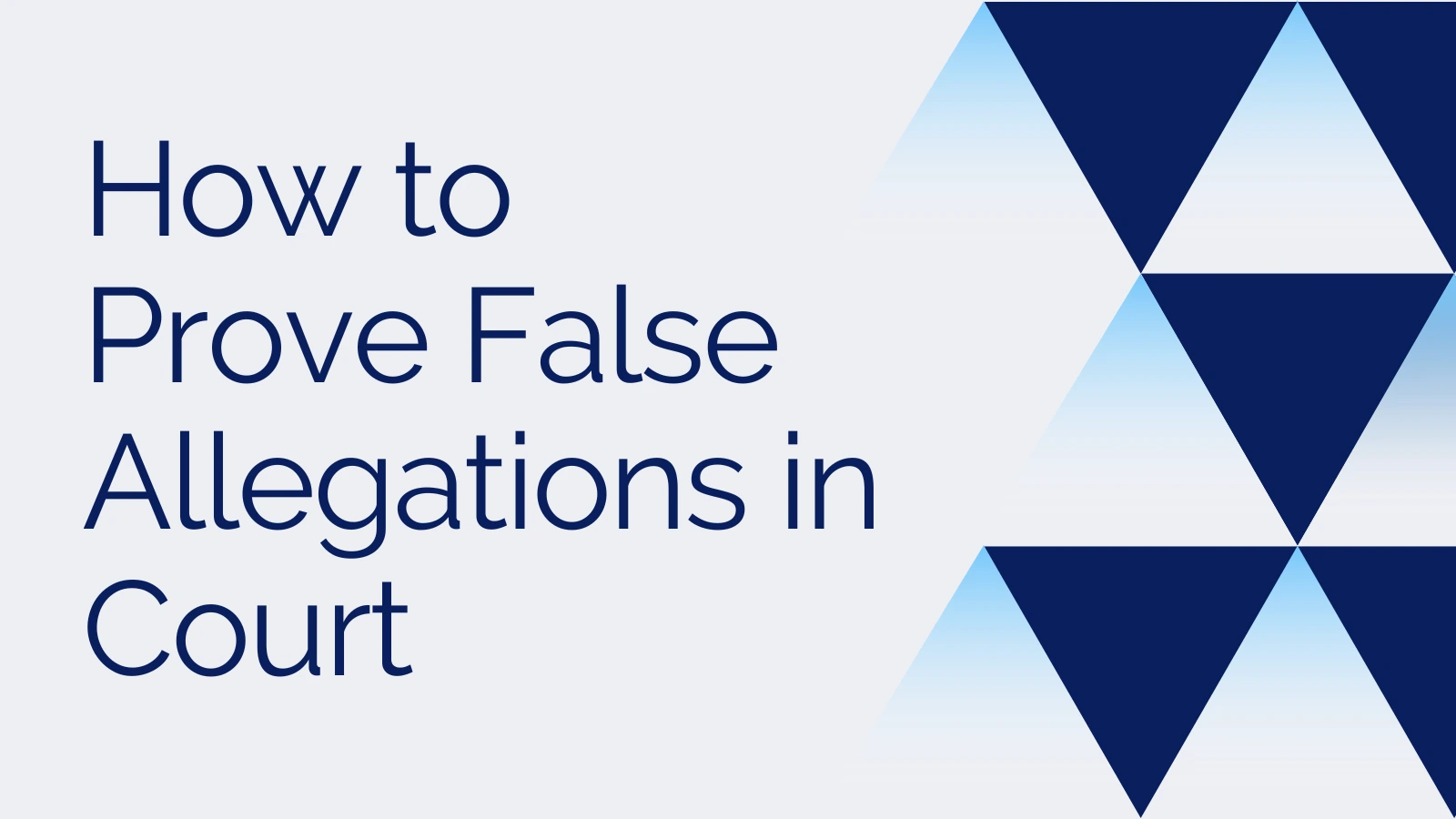How to Prove False Allegations in Court
False allegations can be a serious problem for many people, especially if they lead to criminal charges or legal action. Proving false allegations in court can be challenging, but it is not impossible. In this article, we will discuss the steps you can take to prove false allegations in court.
How to Defend Yourself Against False Accusations
False allegations can be made for a variety of reasons, including personal gain, revenge, or simply as a mistake. Whatever the reason, if you have been falsely accused of a crime or wrongdoing, you need to know how to prove your innocence.
Understanding False Allegations
The first step in proving false allegations in court is to understand what they are. False allegations are accusations that are made against someone without any basis in fact. They can be made intentionally or unintentionally, but they are always untrue.
Types of False Allegations
There are several types of false allegations, including:
- Sexual assault
- Domestic violence
- Child abuse
- Fraud
- Defamation
Steps to Prove False Allegations
Proving false allegations in court can be a lengthy and challenging process. However, with the right evidence and legal representation, it is possible. Here are the steps you can take to prove false allegations in court:
False accusations can ruin a person’s life and have real consequences in criminal and civil proceedings. Unfortunately, false accusations happen in divorce and child custody cases far too often. False accusations can also involve sexual harassment in the workplace, domestic violence, and assault. Many of us assume that the truth will always prevail through the court system. This is not always the case, however. The accused person may not know how to properly defend themselves, having a real effect on their lives. If you have been falsely accused in a legal matter, it is important to know what steps to take. When you use the right strategy and work with an experienced attorney, you have a good chance of clearing your name.
Stay Calm
Being falsely accused of committing a crime can be devastating. For many, being falsely accused of a heinous crime, sexual harassment, or child abuse takes a toll emotionally and physically. After being falsely accused, it is a natural response to try to fight back and defend yourself. However, defending yourself and responding to false accusations in a rash and angry way can hurt your case. It is important to remember that accusations are a marathon, not a sprint.
Hire an Attorney to Help You Fight Back
Whether you are facing false accusations related to a criminal charge or a civil matter, Consulting with an attorney is one of the best things you can do to protect yourself. Hiring an attorney is probably the most important step you can take when facing false accusations. You can try to go it alone and attempt to clear her name, but it will be significantly easier when you have an experienced attorney advocating for you. Your attorney will know the laws of Texas and will be able to use that knowledge for your benefit.
Gather Evidence
After you consult with an attorney, you can begin working with your attorney to gather evidence supporting your case. We always recommend keeping meticulous records if you are going through a contentious divorce or child custody matter. Doing so is important because you will have to prove what you said and how you acted.
Challenge the Accuser’s Credibility
After you meet with your attorney, you and your attorney will begin developing a strategy to combat the false accusations against you. The strategy will depend on many different factors including the type of false accusations and whether you are in civil or criminal court. However, in all different types of cases, an effective strategy involves challenging the witness’s credibility.
Find Your Own Witnesses and Present Evidence of Your Side of the Story
In addition to challenging the person or people who have falsely accused you, you should also find your own witnesses. Just as an accuser can use witnesses against you, you also have the right to use witnesses that can attest to your innocence or the misconduct of another person.
Develop a Strategy in Criminal Defense Cases
If you are defending yourself against criminal accusations, you need an experienced criminal defense attorney on your side. An experienced criminal defense attorney will be able to seek witnesses and gather evidence to dispute false accusations against you.
Develop a Strategy for Fighting False Sexual Accusation Charges
Many false accusations involve some sort of sexual harassment. Being falsely accused of sexual harassment in the workplace can be highly challenging. When an employee reports a claim of sexual harassment, even if it is false, the company is obligated to investigate.
Turn the Charges Around
What if you have been accused of domestic violence, child abuse, or any other crime. Perhaps you have already been arrested and charged for the crime. Remember that making a false report to law enforcement officers is a crime in Texas. Specifically, a person engages in the crime of filing a false police report if he or she has the intent to deceive and knowingly makes a false statement that is material to a criminal investigation.
Remember: Defamation is Illegal in Texas
When you have been falsely accused, it can help to remember that making false accusations against people is often illegal in Texas. Under Texas’s defamation laws, it is illegal for a person or company to cause harm to the reputation of another person or company.
Seek Compensation for False Accusations
As mentioned above, it is illegal to make false accusations against another party in Texas. Depending on the facts in your case, you may be able to seek monetary compensation by filing a defamation lawsuit against the responsible party.
Discuss Your Case With an Experienced Criminal Defense Lawyer Today
Navigating false statements in the legal world can be complicated. In many cases, there are high stakes involved. False accusations can lead to prison sentences and fines. They can also have a long-lasting, negative impact on your career, reputation, immigration status, family relationships, and more.
If you believe that you have been the victim of false accusations, you need to defend yourself. The most effective defense strategy is to hire a qualified criminal defense attorney. These legal experts represent all clients and can help you prevent another party from harming your reputation.
Conclusion
Proving false allegations in court can be a difficult and stressful process. However, with the right evidence and legal representation, it is possible to clear your name and prove your innocence. If you have been falsely accused of a crime or wrongdoing, it is essential to hire a competent attorney and gather as much evidence as possible to support your case.
FAQs
- What is the definition of false allegations?
- False allegations are accusations that are made against someone without any basis in fact.
- What are the types of false allegations?
- The types of false allegations include sexual assault, domestic violence, child abuse, fraud, and defamation.
- What is the first step in proving false allegations in court?
- The first step is to hire a competent attorney.
- What is the importance of gathering evidence?
- Gathering evidence is essential in proving false allegations as it helps to support your case.
- Can false allegations be unintentional?
- Yes, false allegations can be made unintentionally. False allegations can be made due to misunderstandings, miscommunications, or faulty memories. It is important to carefully review the evidence and consider all possible explanations before determining whether an allegation is false.
- How long does it take to prove false allegations in court?
- The length of time it takes to prove false allegations in court can vary depending on the complexity of the case, the amount of evidence, and other factors. It is important to be patient and work closely with your attorney throughout the process.
Q1: Can I represent myself in a false accusation case?
Yes, but hiring an experienced attorney significantly improves your chances of a favorable outcome.
Q2: How can social media impact my case?
Social media posts can serve as evidence. Capture relevant posts promptly, as they may be deleted later.
Q3: Can I sue for defamation if the accusations are proven false?
Yes, defamation laws in Texas allow victims to seek compensation if false statements harm their reputation.
Q4: What is the role of an alibi in defending against false accusations?
An alibi provides evidence that you were elsewhere when the alleged incident occurred, strengthening your defense.
Q5: How can I minimize the impact of false accusations on child custody?
Staying composed, avoiding irrational behavior, and having legal representation are crucial in minimizing the impact on child custody proceedings.
Overall, proving false allegations in court requires a careful and methodical approach. By hiring a competent attorney, gathering evidence, interviewing witnesses, building a strong defense, and presenting your case in court, you can increase your chances of proving your innocence and clearing your name.






